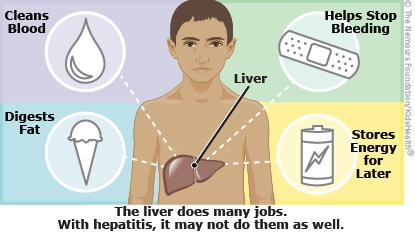Hepatitis B is when the liver gets infected by the hepatitis B virus and might not work as well as it should. The liver, an organ in the right upper abdomen, has several jobs, including breaking down fatty food, storing energy, clearing toxins from the blood, and making proteins that help blood to clot.
Hepatitis B may cause symptoms such as fever, feeling tired, belly pain, jaundice (yellowing of the skin and eyes), joint pain, and nausea or vomiting. In some kids, these symptoms go away within a few weeks or months. But other kids have an infection that lasts longer, and they may need to see a liver specialist.
Hepatitis B symptoms usually go away on their own, but sometimes kids get medicine to help manage them. If your child has the type of hepatitis B that needs long-term treatment, they'll be put on medicine to help avoid problems it could cause in the future.



Your child:

Your child:

How do people get hepatitis B? Hepatitis B can spread through sexual contact, sharing contaminated needles or other items (like razors or toothbrushes), or kidney dialysis. A mother with hepatitis B can pass it to her child during birth. Some people have few or no symptoms. Even without symptoms, an infected person can pass the hepatitis B virus to others.
What can protect others from getting hepatitis B? The hepatitis B vaccine protects against the infection very well. To prevent the spread of hepatitis B, people should always use condoms when having sex, not use intravenous drugs or share needles, and not share toothbrushes or razors. Someone with hepatitis B should not donate blood.